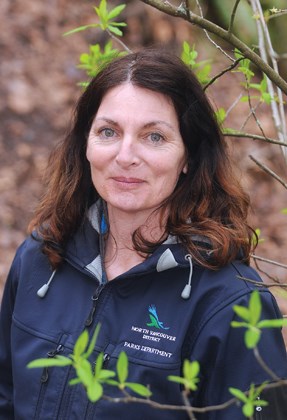The move to a more organic and holistic approach to gardening is taking root in the District of North Vancouver as horticulture staff become organic landcare practitioners.
Over the past few thousand years, organic growing practices were the norm worldwide in agriculture and horticulture. Then, after the Second World War, the chemical revolution occurred, which radically changed those practices. However, after 60 years of chemical dependency on the farm and in the garden, people have realized that chemicals damage the environment and the legalization of "allowable pesticide residues" in our food supply is not worth the benefit. We need a new approach.
Changing the way things are done is never easy. It requires a determined leader to show everyone the way out of their comfort zone and into something new. In the case of the District of North Vancouver, Trisha McCarthy, supervisor of horticulture trades, was the mover of the latest training upgrade for the district's horticulture staff. For some time, McCarthy has wanted to move her staff to a more sustainable and organic approach for growing the district's lands. To get her idea off the ground McCarthy lobbied district management to approve organic training for her staff and she went looking for partners to provide professional training.
Professional training in organic practice in B.C. currently consists of a patchwork of various public, private and non-profit organizations offering part time, short course and some university level organic horticulture/agriculture programs. Those programs are mostly pursued at the grassroots level and not fully embraced by the horticulture and agricultural sectors. Enter the non-profit Society for Organic Urban Land Care (SOUL), which has been working for many years to "Cultivate knowledge of organic land care and support its practice."
SOUL partnered with McCarthy to provide the curriculum and training in organic landcare with Vancity and the Real Estate Foundation of B.C. providing project funding.
SOUL's response to the need for "ecologically responsible land care practices" started in 2003 with the introduction of their Organic Land Care Standard (organiclandcare. org) intended to provide individuals, communities, industries and governments with a means to transition away from chemical-based land care. SOUL's sixth edition of their standard was released in 2013. There are many other organic standards currently being introduced or in voluntary use across the country that seek to steward soil, air and water. Organic standards for food production are currently taking root in Europe and the United States in response to concern about the increasing use of toxic chemicals in our food supply. Organic standards worldwide face numerous implementation roadblocks from timid legislators and pressure from big agribusinesses that do not want to see a drop in consumption or profits. Ultimately, the change our society needs to grow healthy food and gardens will only happen if the average consumer stops buying pesticides, food sprayed with chemicals or any GMOs. Then big agribusinesses will get the message.
I wanted to know more about McCarthy's motivation for change and about the training benefit for district staff. "The opportunity to offer staff leading edge education in horticulture was valuable but staff would also receive professional qualification," said McCarthy.
The five-day intensive training covered broad topics that McCarthy described as, "How to feed the soil (the microbes) not the plants, to increase microbial diversity and not kill them with chemicals and that the fate of any one organism or species is dependent on the fate of all others."
Training was provided for 23 participants from the District of North Vancouver, the City of North Vancouver as well as the head gardener from the Woodcroft residential towers.
McCarthy told me her reason for pushing the change. "For years I really have wanted to see municipalities get off the pesticide applicator certificate requirement process that most municipalities require and bring our practices up-todate to get people to realize that we are living in the dark ages when it comes to using pesticides and sprayers and the existing provincial IPM certificate to apply pesticides, which is, and has been, irrelevant for quite some time."
McCarthy makes a bold statement on the existing provincial certification for IPM (previously known as the B.C. Pesticide Applicator Certificate, env. gov.bc.ca), which does lay out methods to deal with pests and disease holistically, but the certification is really an industry tool to control pesticide use, not eliminate use. "I want to move towards doing the right thing when it comes to landcare and this training helps move the District of North Vancouver one step closer to our goal of being a sustainable community," she said.
Todd Major is a journeyman horticulturist, garden designer and builder, teacher and organic advocate.



